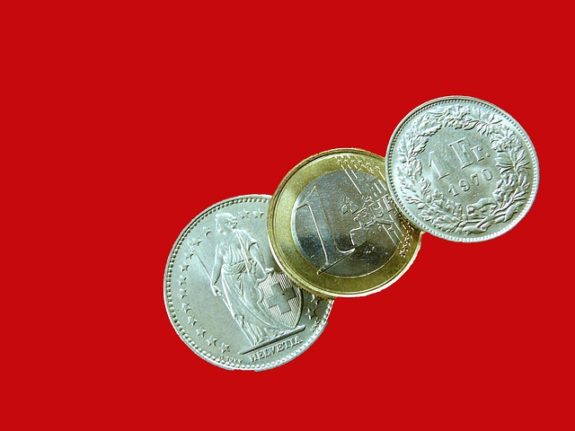We already knew that Switzerland was a super place for the super-rich to live but now it’s official.
The latest government report on wealth distribution, published quietly without a press release last month, shows just how attractive it is.
Taking this measure of the proportion of wealth concentrated in the hands of the richest one per cent, Switzerland is an outlier in Europe. The 44 per cent rate is higher than in the United States, and more comparable to countries like Brazil and Russia.
The government figures are based on data collected from the cantons by the federal tax administration. Total assets minus debts are calculated but pension savings are not included in the calculation because they are not taxable and therefore not listed in tax declarations.
This trend of the mega-rich accumulating more and more wealth is well established in Switzerland. The bloating of the one per cent is now more extreme than at any time since the Second World War. Is this the kind of record Switzerland should be aiming for?
READ ALSO: Why is Switzerland so wealthy?
Cantons compete to attract wealthy residents
Because this phenomenon has not happened by accident. There is a long-standing trend of tax reduction supporting it. Wealth taxes have gone down consistently since the 1990s, led by centre-right parties, with the steady support of voters. Twelve cantons cut the tax rate for top earners in 2021.
What benefits the moderately wealthy individual also benefits the obscenely wealthy individual. Inheritance tax is a good example. There is no inheritance tax on direct descendants in 23 out of 26 cantons, and about half of individual wealth is inherited. Swiss residents inherited an estimated 90 billion francs in 2020.
An ongoing result of this favourable tax climate is that fortunes grow. Cantons compete among themselves to attract rich residents. This means ultra-rich Swiss people are not lured away from the country for tax reasons. Meanwhile, ultra-rich foreigners have compelling reasons to relocate to Switzerland.
There’s no doubt that Switzerland is a comfortable place for a super-rich person to settle. Beyond the tax regime and the some of the best views that money can buy, there are many other lifestyle and financial benefits.
‘It’s a good thing that Switzerland attracts wealthy residents’
The country has a long history of catering for every need of the super-rich, from healthcare to education to top class wealth management services. The luxury sector is highly developed, providing a perfect playground of shopping, dining and exclusive experiences.
But let’s get back to the question of whether the crazily uneven wealth distribution is a problem. It should be pointed out that there are some technical reasons for the recent bulge in wealth distribution.
READ ALSO: Swiss remain richest in world… but it’s not all good news
We have just emerged from a long phase of low-interest rates. When rates are low, asset prices go up. That means things like shares and property, which is what the rich hold. But even if it looks more dramatic than it is, it is still dramatic.
The data for this report only go up to 2018 so things might have changed somewhat. However, other reports have shown that the pandemic did not cause money to drain away from the one per cent. If anything, it worked in their favour financially.
On the face of it, having almost half the country’s personal wealth concentrated in the hands of so few people seems profoundly wrong.
However, according to a leading Swiss expert on wealth distribution, it is rather a net positive. These residents still pay tax and they spend money. “In a narrow national economic sense, it is a good thing to be an attractive place of residence for wealthy foreign nationals,” Professor Marius Brülhart of the University of Lausanne said.
“However, from a more broadly ethical, global point of view, you could ask whether it is fair to lure wealthy foreigners away from where they made their fortune. Those countries are then losing out on some of their most lucrative taxpayers.”
Swiss direct democracy system mitigates that risk of rich meddling
This issue of economic inequality has been debated for years. The wider social context is relevant. It matters a lot more that someone is sitting on a golden toilet when many in the same society are deprived of decent housing, healthcare or education.
READ ALSO: Swiss richer than ever but wealth inequality persists
In a country like Switzerland with a good social security system and generally good standard of living, you could say it’s tolerable for the rich to be left alone to get richer. In 2019, the average gross income of private households in Switzerland was 9,582 francs per month, with 31 per cent of that eaten up by compulsory deductions and health insurance.
It can be the case that the super-wealthy are blocking the dynamism of the economy by sitting on their billions. This feature of wealth inequality appears not to apply in Switzerland where the economy has had a great run over the past couple of decades.
There is also the concern of a small number of financially powerful people using their money to meddle in politics, but the Swiss direct democracy system mitigates that risk.
I hate to admit but, it is an advantage for Switzerland to have these people here rather than in Monaco or London. And it’s true that some individual municipalities benefit handsomely. IKEA’s founder, for example, famously donated 10 million francs towards a housing complex for the elderly in the village in Vaud where he lived for 37 years.
Not that we should rely on charity. It is up to voters to decide how much their rich neighbours must contribute to the public coffers – through the parties they vote for and how they vote on tax questions.
As long as Switzerland can afford to keep the Swiss and foreign one per cent happy, it will continue to do so. Whisper it from the rooftops: the rich are welcome in Switzerland.



 Please whitelist us to continue reading.
Please whitelist us to continue reading.
Member comments